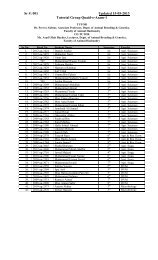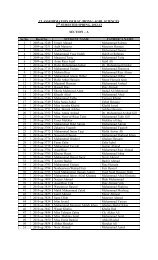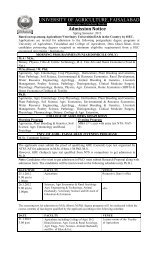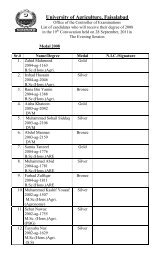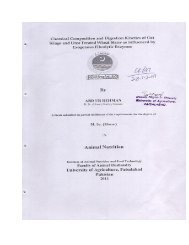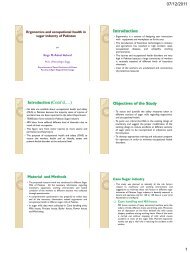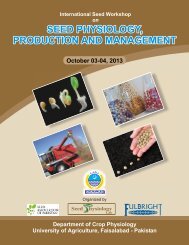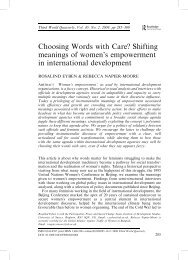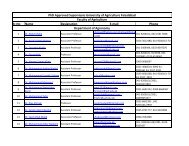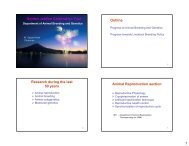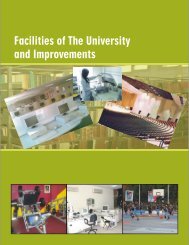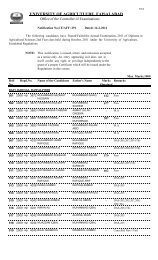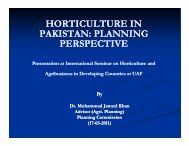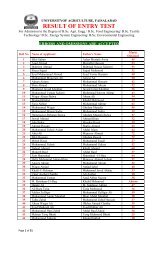Edible Oilseed Crops
Edible Oilseed Crops
Edible Oilseed Crops
You also want an ePaper? Increase the reach of your titles
YUMPU automatically turns print PDFs into web optimized ePapers that Google loves.
<strong>Edible</strong> <strong>Oilseed</strong> <strong>Crops</strong><br />
Threats & Challenges from production to consumption<br />
August 04, 2010<br />
Faisalabad-Pakistan<br />
ORGANIZING COMMITTEE<br />
Dr. Zahid Ata (Convener)<br />
Dr. Mumtaz Akhtar Cheema (OrganizingSecretary)<br />
Dr.Asghar Ali<br />
Dr. Ehsan Ullah<br />
Dr. Muhammad Ayub<br />
Dr. Asif Tanveer<br />
Dr. Riaz Ahmad<br />
Dr. Muhammad Farrukh Saleem<br />
Dr. Muhammad Ashfaq Wahid<br />
Dr. Haroon Zaman Khan<br />
Dr. Fahad Rasul<br />
CONTACT INFORMATION<br />
Dr.Mumtaz Akhtar Cheema<br />
Organizing Secretary<br />
Cell: +923006671175<br />
Phone: +92419200189<br />
Fax: +92419201081<br />
Email: cheemamumtaz@gmail.com<br />
Organized by<br />
Department of Agronomy<br />
University of Agriculture, Faisalabad (UAF)<br />
&<br />
Pakistan Society of Agronomy (PSA)<br />
In collaboration with<br />
Endowment Fund Secretariat, UAF<br />
(a joint collaboration of UAF-USDA for Strengthening Agriculture<br />
Academia and R&D Faculty Development, Technology<br />
Transfer and Product Commercialization)
BACKGROUND<br />
Domestic edible oil production from all sources has grown<br />
@2.56% annually over the last 20 years, whereas the<br />
domestic consumption is increasing at annual rate of 7.7%.<br />
The indigenous edible oil production could not match the<br />
growing demand of population. The graph of population<br />
and urbanization is continuously rising, outstretching the<br />
divergence between demand and domestic production.<br />
This gap is being bridged by importing edible oil costing<br />
substantial chunk of resources. Domestic oil production<br />
during 2007-08 (JulyMarch) was 0.833 million tons, while<br />
2.23 million tons of edible oil was imported and 0.349<br />
million tons recovered from imported oil-seeds. The total<br />
availability of edible oil from all sources amounted to be<br />
3.066 million tons. The import of vegetable oils in<br />
increasing amounts is imposing a severe drain on national<br />
economy. The import bill of edible oil was Rs. 84 billion in<br />
2008-09 and has risen up to >100 billion ( Pak.Rupee) in<br />
2009-10 (Govt. of Pakistan, 2009). All this necessitates<br />
concentrating on more efforts to increase domestic edible<br />
oil production to reduce drain on the foreign exchange<br />
reserves.<br />
Burgeoning population and continuously squeezing land<br />
and water resources is putting enormous pressure for<br />
vertical expansion, therefore, there is a dire need to provide<br />
an opportunity to all the stakeholders to join and deliberate<br />
at one plate form for finding the future research solution.<br />
Feedback from all the Stakeholders (Seed companies,<br />
Farmers/ Growers, Industry and academia) may lead to<br />
address the real challenges confronting with boosting yield<br />
of edible oilseed crops. This workshop will not only help in<br />
identifying the researchable issues, bottlenecks and<br />
constraints of low yield in oilseed crops, rather it will<br />
provide an opportunity in strengthening the linkages<br />
among stakeholders. This could also be a good event for the<br />
graduate students to interact with galaxy of farmers,<br />
researchers and managers (research & development) of<br />
seed companies and industry in identifying real crop<br />
specific production, marketing and policy constraints.<br />
OBJECTIVES<br />
To identify threats and challenges in edible oil<br />
production in the country<br />
To find out possible solutions to overcome these<br />
challenges<br />
To establish the linkages among the stakeholders<br />
UNIVERSITY OF AGRICULTURE,<br />
FAISALABAD<br />
The first major institution of higher agricultural education<br />
created was the Punjab Agricultural College and Research<br />
Institute in 1909. It remained for a major part of the century<br />
the premier seat of learning and training in tropical<br />
agriculture, and made great efforts to promote agrarian<br />
development in the country. After independence, the<br />
Government of Pakistan appointed National Commissions<br />
on Food and Education with the terms of reference to<br />
review, in all its ramifications, the prevailing agrarian<br />
system and to formulate measures for developing the full<br />
potential of our agricultural resources. The Commissions<br />
made a strong plea for establishing an Agricultural<br />
University, which could play a more vigorous role in<br />
promoting research and education in agriculture,<br />
consequently University was established by upgrading the<br />
former Punjab Agricultural College and Research Institute<br />
in the year 1961-62. Important roles of the University are to<br />
provide an ample supply of quality manpower and research<br />
based technologies. To accomplish this, the University of<br />
Agriculture Faisalabad (UAF) is imparting quality education<br />
and research in agriculture sector and hence contributing<br />
significantly towards the economy of the country.<br />
University education is a continuous and creative process.<br />
Its aim is to develop the capacities latent in human nature<br />
and to coordinate their expression for the enrichment and<br />
progress of the society with moral and material knowledge.<br />
DEPARTMENT OF<br />
AGRONOMY<br />
The Agriculture Section, predecessor of Agronomy<br />
Department, was one of the few sections which started<br />
functioning with the establishment of the former Punjab<br />
Agricultural College and Research Institute at Faisalabad<br />
(Lyallpur) in 1906. This Section kept functioning up to 1962<br />
when the status of college was raised to University and was<br />
renamed as Department of Agronomy. Currently<br />
Agronomy is the largest department of the University and<br />
attracts students with highest cumulative grade point<br />
average and hence, has earned the title of "Parent<br />
Department". The mission of the Department of<br />
Agronomy is to generate, integrate, and apply knowledge<br />
about crop plants that are grown for food, feed, fiber and<br />
the general benefit of people. Through the integration of<br />
teaching, research and extension/outreach efforts, we find<br />
and disseminate answers to problems and discover<br />
opportunities concerning efficiency and sustainability of<br />
production, improvements in quality and methods for safe<br />
and environmentally-sound practices. We work to ensure<br />
that agricultural systems and products are able to meet<br />
rapidly-changing current needs and those of future<br />
generations. So far, the department has produced almost<br />
2700 B.Sc. (Hons.), 2150 M.Sc. (Hons.) and 104 Ph.D<br />
students.<br />
PROGRAM



